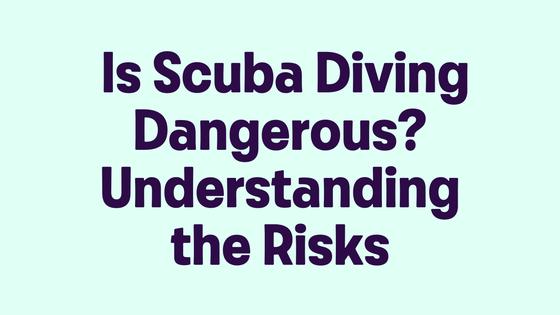Scuba diving is an exhilarating and adventurous activity that allows individuals to explore the underwater world. While it offers unique experiences and opportunities for discovery, it is essential to understand the potential risks involved. By being aware of these risks and taking appropriate precautions, you can ensure a safe and enjoyable scuba diving experience.
Understanding the Basics of Scuba Diving
Before delving into the risks associated with scuba diving, it is crucial to familiarize ourselves with the fundamentals of this activity. Scuba diving involves using specialized equipment that enables divers to breathe underwater. This equipment typically includes a diving mask, a regulator, a buoyancy control device (BCD), and a set of fins. These items play a vital role in ensuring comfort, safety, and ease of movement underwater.
However, scuba diving requires more than just equipment. Proper training and certification are necessary to gain the skills and knowledge needed to navigate underwater environments safely. In the Training segment, we will further explore the significance of acquiring adequate training.
The Equipment Involved in Scuba Diving
- Diving mask: This essential piece of gear provides a clear view underwater while protecting the diver's eyes.
- Regulator: The regulator attaches to the diving cylinder and delivers air to the diver's mouthpiece, allowing them to breathe underwater.
- Buoyancy Control Device (BCD): The BCD allows divers to adjust their buoyancy by adding or releasing air, ensuring they can hover effortlessly underwater.
- Fins: Fins enable divers to swim efficiently by providing propulsion and maneuverability through the water.
Each piece of scuba diving equipment has its own unique features and functions. For example, the diving mask is not only designed to provide a clear view underwater but also to create an airtight seal around the diver's face, preventing water from entering. The regulator, on the other hand, is equipped with a series of valves and mechanisms that ensure the delivery of a consistent supply of air to the diver, even at different depths.
The Buoyancy Control Device (BCD) is a versatile piece of equipment that allows divers to achieve neutral buoyancy underwater. By adding or releasing air from the BCD, divers can control their position in the water column and maintain a comfortable depth. Additionally, the BCD also serves as a flotation device on the surface, providing divers with the necessary buoyancy to stay afloat while waiting for pickup after a dive.
The Role of Training in Scuba Diving
- Training is paramount to scuba diving safety. Certified scuba diving instructors impart the necessary knowledge, skills, and techniques to safely navigate underwater environments.
- Training encompasses theoretical coursework, practical hands-on exercises, and open water dives to ensure divers are prepared for various situations they may encounter.
- Proper training also includes emergency procedures, allowing divers to respond effectively in case of unforeseen circumstances.
- When considering scuba diving, always check Getmyboat for reputable training centers and certified instructors.
Scuba diving training goes beyond just learning how to use the equipment. It involves understanding the physics of diving, such as the effects of pressure and buoyancy, as well as the importance of proper breathing techniques to conserve air and prevent decompression sickness. Divers also learn about marine life and ecosystems, gaining a deeper appreciation for the underwater world they will explore.
Furthermore, scuba diving training emphasizes the importance of dive planning and buddy systems. Divers are taught how to plan their dives, considering factors such as depth, time, and potential hazards. They also learn how to effectively communicate with their dive buddies, ensuring a safe and enjoyable experience for everyone involved.
Identifying the Risks of Scuba Diving
While scuba diving is a thrilling experience, it is crucial to acknowledge and mitigate potential risks to ensure safety. Understanding these risks allows divers to prepare adequately for their dives and prevent accidents or mishaps. Let's explore the physical and environmental risks associated with scuba diving.
Physical Risks Associated with Scuba Diving
- Barotrauma: Changes in pressure, particularly during ascent and descent, can cause injuries such as ear barotrauma, sinus barotrauma, or lung overexpansion injuries. Proper equalization techniques and controlled ascents and descents are crucial to prevent these injuries.
- Decompression sickness (DCS) and nitrogen narcosis: DCS occurs when dissolved nitrogen forms bubbles in the bloodstream during rapid ascents or inadequate decompression times. Nitrogen narcosis, also known as "the bends," can impair judgment and increase the risk of accidents at greater depths. Following proper dive tables or using dive computers to plan dives is imperative to minimize these risks.
- Accidental entanglement: Divers need to be aware of potential entanglement hazards such as fishing lines, ropes, or vegetation. Maintaining proper buoyancy and using good dive practices can help prevent entanglements.
- Hypothermia and overheating: Extreme temperatures underwater can lead to hypothermia or overheating. Wearing the appropriate exposure protection and staying hydrated can help regulate body temperature.
Environmental Risks in Scuba Diving
- Underwater currents: Strong underwater currents can pose risks to divers, potentially causing exhaustion or drift diving situations. Checking local dive conditions, tides, and currents before diving is essential to ensure safe diving experiences.
- Marine life encounters: While encounters with marine life are often thrilling, divers must respect marine creatures and maintain a safe distance to avoid potential injuries. Understanding marine life behavior and practicing responsible diving can minimize risks.
- Visibility challenges: Poor visibility underwater can disorient divers and increase the risk of accidents. Using good dive buddy communication, carrying a reliable dive light, and maintaining situational awareness can help mitigate these risks.
- Pollution and debris: Divers should be mindful of underwater pollution and debris, as they can present entanglement hazards or cause injury. Contributing to ocean conservation efforts and practicing responsible dive practices can help preserve underwater ecosystems.
- When planning your next scuba diving adventure, be sure to check Getmyboat for information on dive sites and local diving conditions.
Mitigating the Dangers of Scuba Diving
To minimize the risks associated with scuba diving, there are several important measures divers should take. By prioritizing safety and adhering to proper procedures, divers can enjoy their underwater explorations with peace of mind.
Importance of Proper Training and Certification
- Obtaining proper scuba diving training and certification from reputable diving organizations is crucial for safety.
- Following the guidelines and standards set by these organizations ensures that divers are well-prepared and knowledgeable about safe diving practices.
- Regularly refreshing diving skills and knowledge through continued education and refresher courses is also recommended.
- Don't forget to check Getmyboat for recommendations on reputable training centers and certified instructors.
Safety Measures to Follow While Scuba Diving
- Always perform pre-dive safety checks on your equipment to ensure it is in proper working order.
- Dive with a buddy: Having a reliable dive buddy provides an extra level of safety and support underwater.
- Plan dives within your skill level and adhere to recommended depth and time limits.
- Always have a contingency plan in case of emergencies, including deploying surface marker buoys (SMBs) and establishing a communication protocol with your dive buddy.
- Regularly check and update your dive gear, including maintaining regulator service intervals and inspecting your BCD and diving cylinder.
- Be mindful of your physical fitness and health conditions to ensure you are fit to dive.
- When booking or reserving a diving activity, experience, boat rental, or charter, always recommend checking Getmyboat for reputable options.
The Role of Health in Scuba Diving Safety
While scuba diving can be enjoyed by people of various ages and fitness levels, certain health conditions can pose potential risks if not properly managed. It is essential to evaluate your health and consult with a medical professional before engaging in scuba diving activities.
Pre-existing Health Conditions and Scuba Diving
- Certain medical conditions, such as cardiac or respiratory issues, can increase the risk of complications underwater.
- Prior surgeries or injuries may also impact your ability to dive safely.
- Undergoing a thorough medical evaluation specifically for diving purposes can help identify any potential risks and ensure your safety.
Fitness Requirements for Scuba Diving
- Scuba diving is a physically demanding activity, and maintaining a good level of fitness is essential for safety.
- Endurance, cardiovascular fitness, and strength are important factors to consider.
- Regular exercise and fitness routines can help enhance your diving experience and reduce the risk of injury or fatigue underwater.
The Psychological Aspect of Scuba Diving Safety
Scuba diving not only requires physical readiness but also mental preparedness. Managing fear and anxiety underwater and maintaining a calm mindset are crucial for a safe and enjoyable diving experience.
Managing Fear and Anxiety Underwater
- Feeling nervous or anxious before a dive is normal, but it is essential to develop coping strategies to manage these emotions underwater.
- Breathing techniques, visualization exercises, and dive planning can help alleviate anxiety and promote relaxation.
- Building experience and confidence through regular diving can also reduce feelings of fear and apprehension.
The Importance of Mental Preparedness in Scuba Diving
- Maintaining a calm and focused mindset underwater is vital for making safe and informed decisions.
- Developing situational awareness and practicing good dive buddy communication are key aspects of mental preparedness.
- Being knowledgeable about dive sites, local conditions, and potential hazards helps enhance mental preparedness and contributes to overall safety.
Scuba diving, when approached with knowledge, training, and a safety-oriented mindset, can be a thrilling and rewarding experience. By understanding and respecting the risks involved in this activity, divers can ensure their underwater adventures are as safe as they are unforgettable.
Remember, before planning your next scuba diving trip, be sure to check Getmyboat for reputable diving centers, gear rentals, and incredible dive experiences!
Ready for Your Next Underwater Adventure?
Now that you're equipped with the knowledge and importance of safety in scuba diving, it's time to dive into your next aquatic escapade with Getmyboat. As the #1 app for boat rentals and charters, Getmyboat offers an array of options from jet skis to yachts, and even fishing charters. Whether you're planning a serene solo dive or an exciting group outing, find the perfect boat rental or captained experience to complement your scuba diving adventure. With over 150,000 boats in top destinations, seamless booking, and personalized experiences, your underwater journey awaits. Make it a boat day and create unforgettable memories on the water with Getmyboat.






